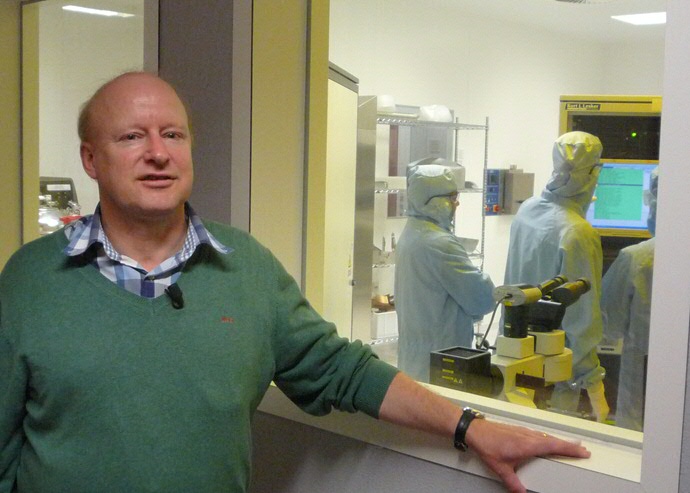University of Groningen graphene research continues to excel

University of Groningen Professor of Applied Physics Bart van Wees maintains his leading position within European graphene research. His work package in the European Graphene Flagship programme – which has generated investment of no less than € 1 billion over a period of ten years – has been approved for a second term. In addition, Van Wees, who is also affiliated to the University of Groningen Zernike Institute for Advanced Materials (ZIAM), has managed, together with a number of partners, to attract a new grant from the FLAG-ERA programme, which funds fundamental research related to the Flagship programme.
The Flagship programme was launched in 2013 as one of two EU programmes to stimulate new and upcoming technology. The second programme focuses on developing a simulation of the human brain. The graphene programme, which is investigating the possibilities offered by this two-dimensional carbon super material, involves sixteen active work packages (workgroups): eleven in the field of research and five dealing with policy. Van Wees was appointed workgroup leader of the programme investigating how graphene can be applied in spintronics, a field of electronics that makes use of electron spin, an intrinsic magnetic property of electrons.
Positive assessment
The Flagship programme initially started for a period of thirty months. The programmes were recently assessed to see whether their results were satisfactory enough to justify a second term. Van Wees’ Spintronics Work Package has received a positive assessment and will be allowed to proceed for the next two-year period, from 2016 to 2018. ‘We are really happy about it,’ says Van Wees. ‘It was a very serious international assessment committee. And we were even able to extend our budget, despite an increase in the number of work packages.’
Applications
In the coming period the participating research groups are expected to focus more on applications. To this end they have been joined by an industrial partner, the Swedish NanOsc, a company that is already active in the production of spintronics. Van Wees: ‘They want to see whether graphene works better for their applications than metal-based material.’ For Van Wees, being given the green light to proceed has meant that he is now able to appoint two postdocs for a period of two years each.
One-dimensional graphene
In addition, Van Wees is also a member of a group funded by the FLAG-ERA programme. This programme is intended to provide additional funding for fundamental research focusing on the two Flagship programmes. The Dutch research funding organizations, the Netherlands Organisation for Scientific Research (NWO) and the Foundation for Fundamental Research on Matter (FOM), are also participating in this programme. ‘In this context we will be investigating an exceptional form of graphene that is actually one-dimensional’, explains Van Wees, who can now use the additional support from FOM to appoint a PhD student.
Magnetic graphene
Earlier experiments have shown that peculiar effects arise in these graphene nanowires. Normally the electron spin can have one of two values: up or down. An electric current allows for both directions. ‘But in the nanowires, we see that only one type of spin can pass through at any given time, only up or only down. When this happens, the graphene becomes magnetic.’ Carbon is not as a rule a magnetic material. ‘We want to investigate what happens exactly and how we can use this to build smaller spintronic circuits.’
Note to the editor
-
For more information, please contact Professor Bart van Wees .
-
Video Unifocus following on an article published in Nature Physics on 14 september 2015.
More news
-
10 February 2026
Why only a small number of planets are suitable for life
-
09 February 2026
Can we make the earth spin in the opposite direction?
